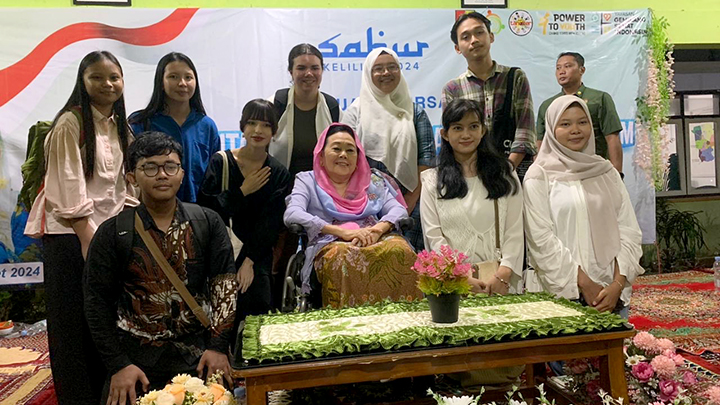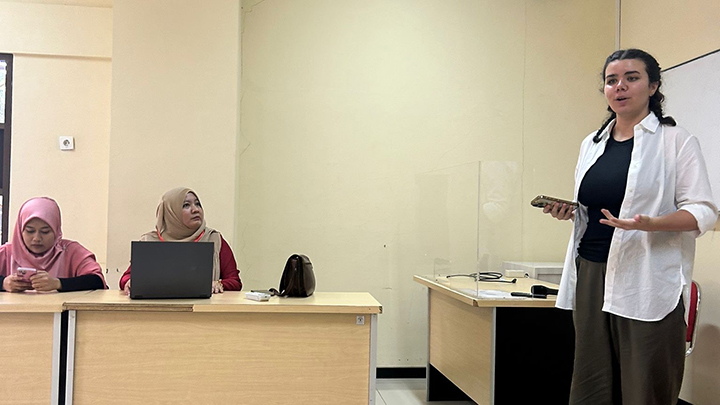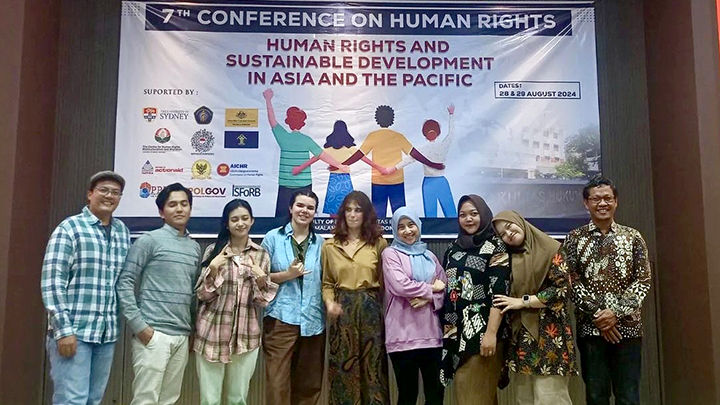Sarah Davisson reflects on her internship with a human rights organization in Indonesia
An invaluable international experience, Davisson finds her place among the multicultural Southeast Asian academic hub for religion-based discrimination.

In her search for post-graduation fulfillment, SDSU alumna Sarah Davisson uncovered a new passion abroad. During her time overseas interning for the Centre for Human Rights, Multiculturalism, and Migration (CHRM2) at the University of Jember in Indonesia, Davisson unearthed her interest in religion-based discrimination and its impact on policy in Southeast Asia and the United States. Davisson said, “Religious diversity is fascinating to me. I want to study the multiculturalism of the area and how that affects government and policy. I definitely want to go back and study more.”
Davisson graduated in August 2024, with a degree in political science and an emphasis in human rights. She returned from a six-month internship with CHRM2 with a new perspective. Her experiences at the centre prepared her to move abroad to London, where she is working on her master’s in violence, conflict, and development at the SOAS, (School of Oriental and African Studies) University of London.
After completing her university requirements, Davisson was in search of the perfect experience to fill the newfound time she had before heading into her master's program. She discovered the opportunity while browsing San Diego State University’s Center for Human Rights website. Davisson promptly started the application process, submitting her resume, reference letters, and essay. “It was kind of an interesting process,” Davisson said. Regardless, she felt immediately included and accepted during her interview with Grace Cheng, director of the Center for Human Rights. In the good company of previous interns from Princeton, Stanford, and other notable institutions, Davisson was selected as the first SDSU student to work with CHRM2.

The Centre for Human Rights, Multiculturalism, and Migration is an academic hub for human rights in Southeast Asia, which has a history of political volatility. The centre aspires to address human rights, migration, and the associated multicultural political issues. Cheng, the organizer of Davisson’s internship said, “The centre has played an important role in providing a base for continued research and discussion about human rights issues in the region and beyond.” Cheng highlights the centre’s annual conference on human rights, which brings together researchers from across the area.
“The primary purpose of the internship is to support the editorial staff in their work editing articles for the centre's English-language journal publications,” Cheng said. However, the centre also aims to enrich the intern's experience by providing various other learning and experiential opportunities. Affirming this focus, Davisson said, “I did a lot of copy editing for the English language journal articles. I learned extensively about niche Indonesian issues, human rights, and law.”
Outside its academic opportunities, both Cheng and Davisson emphasize the personal and community benefits of the internship. “The centre's director and other affiliated faculty, as well as its staff, are dynamic individuals with a strong commitment to promoting research, understanding, and forums on these issues,” Cheng said. “Everybody there was so welcoming and amazing,” Davisson said, “Because it's a pretty small center, it's also pretty tight-knit. They're kind of like family.”
Davisson eagerly recommends an internship with the Centre for Human Rights, Multiculturalism, and Migration to everyone because the international travel and the amazing people who work there make it an invaluable experience. Cheng believes that “anyone interested in gaining international experience (especially in Indonesia or Southeast Asia) in human rights, including academic research and advocacy” will benefit from these continuing internship opportunities in Indonesia.
Davisson’s opportunity was funded by a generous grant from the Peacemakers Fund at the San Diego Foundation. In honor of the foundation’s late founder William Mundt, students who receive this grant are often referred to as Mundt Scholars.
While CHRM2 continues to provide free accommodation in university housing and funds for limited local travel, the Center for Human Rights is currently seeking to secure a benefactor to cover the remaining expenses of sending future students on this incredible, international experience.

